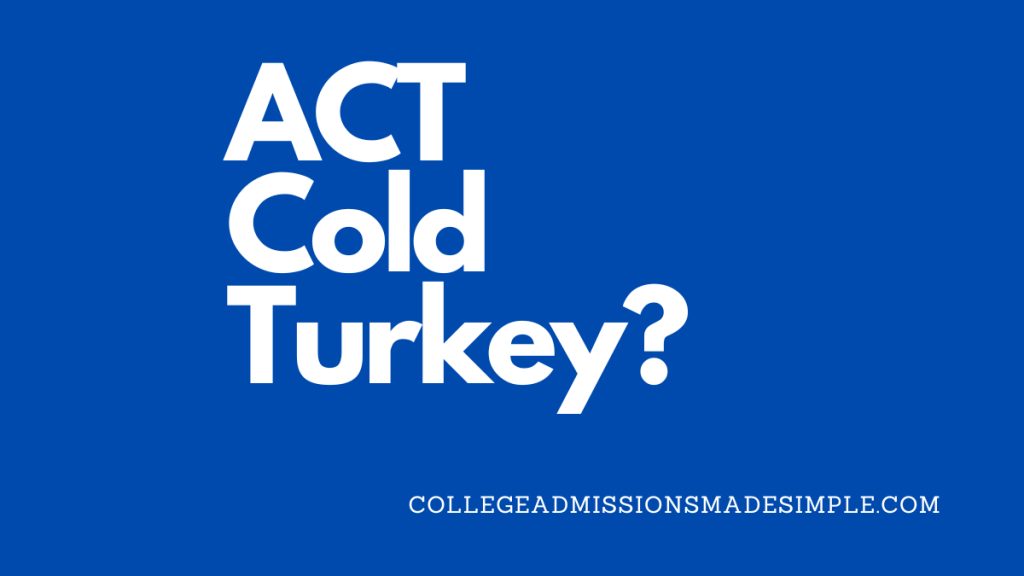Taking the ACT test cold turkey, or without studying, is generally not recommended. The ACT is a standardized test that measures students’ skills in English, mathematics, reading, and science reasoning. Many colleges and universities in the United States use the ACT as part of their admissions process, so performing well on the test can be important for your academic future.
Here are a few factors to consider:
Familiarity with the Format
The ACT has a specific format and time constraints. Studying and practicing can help you become more familiar with the test structure, enabling you to answer questions more efficiently and accurately. The ACT (American College Testing) is a standardized test commonly used for college admissions in the United States. It is designed to measure students’ academic achievement in four main subject areas: English, Mathematics, Reading, and Science. The ACT has a multiple-choice format, which is similar to other standardized tests, such as the SAT (Scholastic Assessment Test).
Overview of the ACT format:
English
This section consists of 75 multiple-choice questions that test your understanding of English grammar, punctuation, sentence structure, and rhetorical skills. You will have 45 minutes to complete this section.
Mathematics
The math section consists of 60 multiple-choice questions that assess your knowledge of algebra, geometry, and trigonometry, as well as some basic statistics and probability concepts. You have 60 minutes to complete this section.
Reading
This section has 40 multiple-choice questions that measure your reading comprehension skills. You will read several passages and answer questions about the content, main ideas, and inferences that can be drawn from the text. You have 35 minutes to complete this section.
Science
The science section consists of 40 multiple-choice questions that test your ability to interpret and analyze scientific data, as well as your understanding of scientific concepts and principles. This section includes passages and data from various scientific disciplines, such as biology, chemistry, physics, and Earth science. You have 35 minutes to complete this section.
Optional Writing Test
In addition to the four main sections, the ACT offers an optional Writing Test, which requires you to write an essay in response to a given prompt. You have 40 minutes to complete the essay. While not all colleges and universities require the Writing Test, some may use it for admissions or placement purposes.
Familiarity with the Material
The ACT covers a wide range of topics that you may have learned throughout high school. Studying helps ensure that you have a solid understanding of these topics and can identify any areas where you may need to improve.
English
Usage and Mechanics: This includes punctuation (commas, apostrophes, colons, etc.), grammar and usage (subject-verb agreement, pronoun usage, verb forms, etc.), and sentence structure (sentence fragments, comma splices, parallelism, etc.).
Rhetorical Skills: This involves strategy (determining the author’s purpose, organizing ideas, etc.), organization (effective introductions, conclusions, and transitions), and style (tone, word choice, and sentence variety).
Mathematics
Pre-Algebra
- Basic arithmetic
- Number properties,
- Factors and multiples
- Operations with fractions, decimals, and percentages
Elementary Algebra
- Solving linear equations and inequalities
- Working with algebraic expressions
- Understanding basic functions and their properties
Intermediate Algebra
- Quadratic equations
- Systems of equations
- Rational and radical expressions
- Absolute value equations and inequalities
- Sequences and patterns
Coordinate Geometry
- Graphing equations
- Slope, distance, and midpoint formulas
- Parallel and perpendicular lines
- Conic sections (circles, parabolas, ellipses, and hyperbolas)
Plane Geometry
- Properties of triangles, quadrilaterals, circles, angles, lines
- Area
- Volume.
Trigonometry
- Basic trigonometric functions
- Identities
- Solving trigonometric equations
- Right triangle trigonometry
- Applications of trigonometry.
Reading
The Reading section measures your reading comprehension skills through a series of passages from various genres. The material covered includes:
Literary Narrative or Prose Fiction: Passages may be drawn from short stories, novels, or memoirs.
Social Sciences: Passages in this category may cover topics such as psychology, sociology, history, and anthropology.
Humanities: Passages may involve topics related to art, music, theater, architecture, or literature.
Natural Sciences: Passages in this area can include topics from biology, chemistry, physics, Earth science, and other scientific disciplines.
Science
The Science section assesses your ability to interpret and analyze scientific data, as well as your understanding of scientific concepts and principles. The material covered includes:
Data Representation: Interpreting and analyzing graphs, tables, diagrams, and other forms of scientific data.
Research Summaries: Understanding the design, execution, and results of scientific experiments.
Conflicting Viewpoints: Evaluating different explanations or hypotheses for a given scientific phenomenon.
Keep in mind that the Science section does not require extensive background knowledge in specific scientific disciplines but focuses on your ability to analyze and interpret data, as well as draw conclusions from scientific information.
Test-Taking Strategies
Studying for the ACT can also help you develop test-taking strategies, such as time management, educated guessing, and eliminating incorrect answer choices.
Confidence
Being well-prepared for the ACT can boost your confidence on test day, which may lead to better performance.
However, if you have a strong academic background, are confident in your skills, and are a good test-taker, you may decide to take the ACT without studying. Keep in mind that if you are not satisfied with your initial score, you can retake the test after further preparation.

